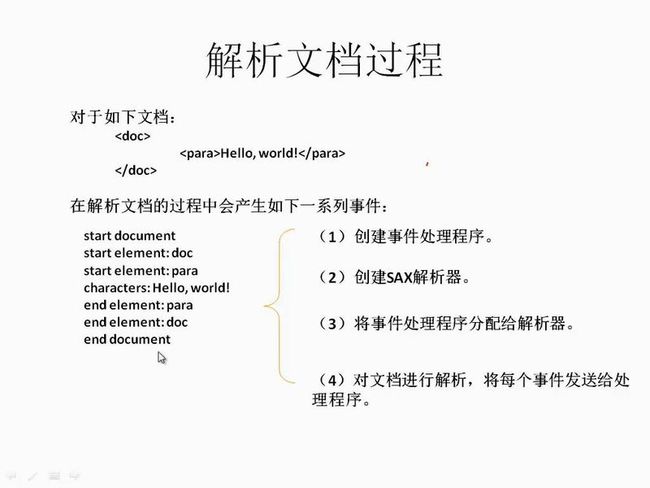Android学习笔记——xml
转自http://blog.csdn.net/sam_zhang1984
解析 XML 有两种方式: SAX 和 DOM 。它们各有利弊。
DOM 是把 XML 文档全部装载到内存中,然后当成一树进行处理。其好处是当成树处理起来比较方便,但弊端是如果 XML 文件比较大时,会对内存消耗比较大;
SAX 是逐行扫描 XML 文档,逐行解析,而且可以在处理 XML 文档过程中的任意时刻中止处理过程,比如找到我们的目标节点,剩下的 XML 文档内容就可以不读了,直接结束。其弊端是操作起来相对不方便,而且对 XML 文档进行处理,如果修改、新增、删除等操作比较不方便。
SAX 是事件驱动型 XML 解析的一个标准接口。它的工作原理是读到文档的开始与结束、标签元素的开始与结束、内容实体等地方时,触发相应的函数,我们就可以在相应的函数中进行我们所要进行的处理。
XML 解析主要需要进行下列步骤:
1. 创建事件处理程序
2. 创建 SAX 解析器
3. 将事件处理程序分配给解析器
4. 对文档进行解析,将每个事件发送给处理程序。
以下的代码是MainActivity.java中的代码
package com.example.xml; import java.io.StringReader; import javax.xml.parsers.SAXParserFactory; import com.example.utils.HttpDownloader; import org.xml.sax.InputSource; import org.xml.sax.XMLReader; import android.app.Activity; import android.os.Bundle; import android.view.View; import android.view.View.OnClickListener; import android.widget.Button; public class MainActivity extends Activity { /** Called when the activity is first created. */ private Button parseButton ; @Override public void onCreate(Bundle savedInstanceState) { super.onCreate(savedInstanceState); setContentView(R.layout.activity_main); parseButton = (Button)findViewById(R.id.parseButton); parseButton.setOnClickListener(new ParseButtonListener()); } class ParseButtonListener implements OnClickListener{ public void onClick(View v) { HttpDownloader hd = new HttpDownloader(); String resultStr = hd.download("http://192.168.1.107:8081/voa1500/test.xml"); System.out.println(resultStr); try{ //创建一个SAXParserFactory SAXParserFactory factory = SAXParserFactory.newInstance(); XMLReader reader = factory.newSAXParser().getXMLReader(); //为XMLReader设置内容处理器 reader.setContentHandler(new MyContentHandler()); //开始解析文件 reader.parse(new InputSource(new StringReader(resultStr))); } catch(Exception e){ e.printStackTrace(); } } } }
以下的代码是MyContentHandler.java中的代码
package com.example.xml; import org.xml.sax.Attributes; import org.xml.sax.SAXException; import org.xml.sax.helpers.DefaultHandler; public class MyContentHandler extends DefaultHandler { String hisname, address, money, sex, status; String tagName; public void startDocument() throws SAXException { System.out.println("````````begin````````"); } public void endDocument() throws SAXException { System.out.println("````````end````````"); } public void startElement(String namespaceURI, String localName, String qName, Attributes attr) throws SAXException { tagName = localName; if (localName.equals("worker")) { //获取标签的全部属性 for (int i = 0; i < attr.getLength(); i++) { System.out.println(attr.getLocalName(i) + "=" + attr.getValue(i)); } } } public void endElement(String namespaceURI, String localName, String qName) throws SAXException { //在workr标签解析完之后,会打印出所有得到的数据 tagName = ""; if (localName.equals("worker")) { this.printout(); } } public void characters(char[] ch, int start, int length) throws SAXException { if (tagName.equals("name")) hisname = new String(ch, start, length); else if (tagName.equals("sex")) sex = new String(ch, start, length); else if (tagName.equals("status")) status = new String(ch, start, length); else if (tagName.equals("address")) address = new String(ch, start, length); else if (tagName.equals("money")) money = new String(ch, start, length); } private void printout() { System.out.print("name: "); System.out.println(hisname); System.out.print("sex: "); System.out.println(sex); System.out.print("status: "); System.out.println(status); System.out.print("address: "); System.out.println(address); System.out.print("money: "); System.out.println(money); System.out.println(); } }
以下的代码是FileUtils.java中的代码
package com.example.utils; import java.io.File; import java.io.FileOutputStream; import java.io.IOException; import java.io.InputStream; import java.io.OutputStream; import android.os.Environment; public class FileUtils { private String SDPATH; public String getSDPATH() { return SDPATH; } public FileUtils() { //得到当前外部存储设备的目录 // /SDCARD SDPATH = Environment.getExternalStorageDirectory() + "/"; } /** * 在SD卡上创建文件 * * @throws IOException */ public File creatSDFile(String fileName) throws IOException { File file = new File(SDPATH + fileName); file.createNewFile(); return file; } /** * 在SD卡上创建目录 * * @param dirName */ public File creatSDDir(String dirName) { File dir = new File(SDPATH + dirName); dir.mkdirs(); return dir; } /** * 判断SD卡上的文件夹是否存在 */ public boolean isFileExist(String fileName){ File file = new File(SDPATH + fileName); return file.exists(); } /** * 将一个InputStream里面的数据写入到SD卡中 */ public File write2SDFromInput(String path,String fileName,InputStream input){ File file = null; OutputStream output = null; try{ creatSDDir(path); file = creatSDFile(path + fileName); output = new FileOutputStream(file); byte buffer [] = new byte[4 * 1024]; int len=-1; while((len=input.read(buffer)) != -1){ //在这里使用另一个重载,防止流写入的问题. output.write(buffer,0,len); } output.flush(); } catch(Exception e){ e.printStackTrace(); } finally{ try{ output.close(); } catch(Exception e){ e.printStackTrace(); } } return file; } }
以下的代码是HttpDownloader.java中的代码
package com.example.utils; import java.io.BufferedReader; import java.io.File; import java.io.IOException; import java.io.InputStream; import java.io.InputStreamReader; import java.net.HttpURLConnection; import java.net.MalformedURLException; import java.net.URL; public class HttpDownloader { private URL url = null; /** * 根据URL下载文件,前提是这个文件当中的内容是文本,函数的返回值就是文件当中的内容 * 1.创建一个URL对象 * 2.通过URL对象,创建一个HttpURLConnection对象 * 3.得到InputStram * 4.从InputStream当中读取数据 * @param urlStr * @return */ public String download(String urlStr) { StringBuffer sb = new StringBuffer(); String line = null; BufferedReader buffer = null; try { // 创建一个URL对象 url = new URL(urlStr); // 创建一个Http连接 HttpURLConnection urlConn = (HttpURLConnection) url .openConnection(); // 使用IO流读取数据 buffer = new BufferedReader(new InputStreamReader(urlConn .getInputStream())); while ((line = buffer.readLine()) != null) { sb.append(line); } } catch (Exception e) { e.printStackTrace(); } finally { try { buffer.close(); } catch (Exception e) { e.printStackTrace(); } } return sb.toString(); } /** * 该函数返回整形 -1:代表下载文件出错 0:代表下载文件成功 1:代表文件已经存在 */ public int downFile(String urlStr, String path, String fileName) { InputStream inputStream = null; try { FileUtils fileUtils = new FileUtils(); if (fileUtils.isFileExist(path + fileName)) { return 1; } else { inputStream = getInputStreamFromUrl(urlStr); File resultFile = fileUtils.write2SDFromInput(path,fileName, inputStream); if (resultFile == null) { return -1; } } } catch (Exception e) { e.printStackTrace(); return -1; } finally { try { inputStream.close(); } catch (Exception e) { e.printStackTrace(); } } return 0; } /** * 根据URL得到输入流 * * @param urlStr * @return * @throws MalformedURLException * @throws IOException */ public InputStream getInputStreamFromUrl(String urlStr) throws MalformedURLException, IOException { url = new URL(urlStr); HttpURLConnection urlConn = (HttpURLConnection) url.openConnection(); InputStream inputStream = urlConn.getInputStream(); return inputStream; } }
以下的代码是activity_main.xml中的代码
<?xml version="1.0" encoding="utf-8"?> <LinearLayout xmlns:android="http://schemas.android.com/apk/res/android" android:orientation="vertical" android:layout_width="fill_parent" android:layout_height="fill_parent" > <TextView android:layout_width="fill_parent" android:layout_height="wrap_content" android:text="@string/hello_world" /> <Button android:id="@+id/parseButton" android:layout_width="fill_parent" android:layout_height="wrap_content" android:text="开始解析XML"/> </LinearLayout>
